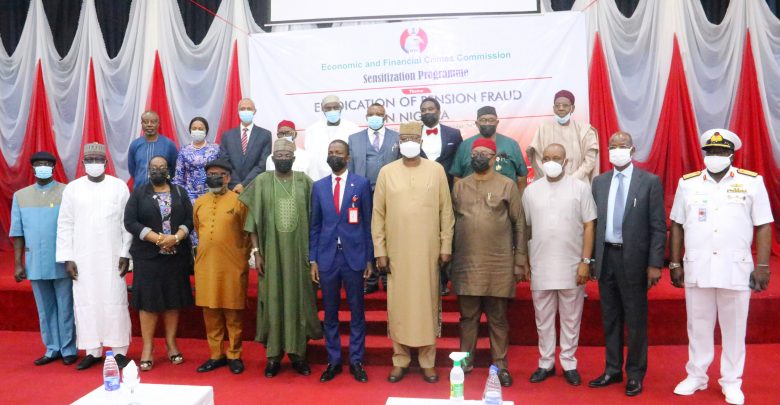All Posts in "PenCom"
PenCom, PenOp plan industry media campaign on MPP
PenCom, EFCC collaborate to end fraud, mismanagement of pension funds
CAPTION
5th from right: Mr. Boss Mustapha (Secretary to the Government of the Federation), 6th from right: Mr. Abdulrasheed Bawa (Executive Chairman, Economic & Financial Crimes Commission), 2nd from right: Mr. Clement Oyedele Akintola (Commissioner Inspectorate, National Pension Commission Representing the DG, National Pension Commission), 4th from right: Senator Michael Ama Nnachi (Representing Chairman, Senate Committee on Anti-Corruption), 1st from left: Comrade Ayuba P. Wabba ( President, Nigeria Labour Congress), 2nd from left: IGP Sulaiman Abba Rtd (Chairman, Nigeria Police Force Pensions Limited), 3rd from left: Mrs. Nneka Obi-Amalu (Acting Executive Secretary, Pension Transitional Arrangement Directorate, PTAD), 4th from left: Prof. ACB Agbazuere (Representing Executive Governor of Abia State, 1st from right: Commodore Saburi Lawal (Chairman, Military Pensions Board).
By Favour Nnabugwu
National Pension Commission (PenCom) in collaboration with the Economic and Financial Crimes Commission (EFCC)to put an end to fraud and mismanagement of pension funds in the country
The workshop which was held today at the NAF Conference Centre, Abuja, ,theme: ‘Eradication of Pension Fraud in Nigeria’, served as a platform for sensitization and practical exchange of information on how best to eradicate Pension Fraud in Nigeria.
The Director General of the Commission, Aisha Dahir-Umar said that the workshop essentially seeks to examine the incidences of fraud in the pension sector in Nigeria and ways of eradicating the menace in a proactive manner.
She said the event will, no doubt, create the synergy needed to boost the efforts of the two organizations in the discharge of their respective statutory mandates relating to the theme of the workshop.
Represented by Mr. Clement Oyedele Akintola, Commissioner Inspectorate, she noted that the problems of fraud and mismanagement in the pension sector in Nigeria were amongst the reasons that necessitated the pension reform of 2004 by the Federal Government.
“The Pension Reform Act 2004, which was later reviewed and re-enacted in 2014, introduced legal and institutional frameworks aimed at addressing the rot that characterized the administration of pensions in the pre-reform era. The Act also established PenCom to regulate and supervise all pension matters in Nigeria, including the licensing of Pension Fund Administrators (PFAs) and Pension Fund Custodians (PFCs).
The Pension Transitional Arrangements Directorate (PTAD) was also established by the PRA 2014 to administer, in a transparent manner, the Defined Benefits Scheme (DBS) for pensioners exempted from the Contributory Pension Scheme (CPS).
These measures, according to her substantially restored credibility and confidence in Nigeria’s pension systems.
“Thus, we have, today, an industry that has accumulated pension assets in excess of N13 trillion, invested in various aspects of the economy and still growing.”
Pursuant to its statutory mandate under Section 23(f) of the PRA 2014, PenCom has consistently undertaken public education, enlightenment and awareness campaigns on the CPS and other pension matters. It has also developed and established structures, systems and procedures that ensure transparency, accountability and efficiency in the administration of pension in Nigeria.
These systems and procedures have become reference points for other African countries, many of whom have undertaken study visits to the Commission.
“However, as it is the case with every human endeavor, retrogressive elements continued to exploit procedural gaps in the operations of pension practitioners in both the CPS and DBS to the detriment of unsuspecting public.
” Thus, new issues and challenges continue to emerge, which place special responsibility on the regulators, the operators and other stakeholders to constantly review their operating environment with a view to finding solutions to address the problems.”
She further said that the PRA 2014 had strengthened Nigeria’s pension institutions in both the Contributory and Defined Benefits Schemes, and imbued them with the capacity to rise above emerging challenges. Thus, while these institutions explore their respective…, the continued collaboration with the EFCC would certainly serve as catalyst for reducing the menace of fraud in the pension industry to the barest minimum.
“We must recognize the uniqueness of today’s workshop, which has literally taken our collaboration to the next level. Stakeholders have all converge to discuss within the two days of this workshop, the entire ramifications of fraud in the pension administration space, understand the issues, share experiences and find proactive ways of preventing their occurrence. “
She also commended the foresight and dynamism of the leadership of the EFCC for accepting to collaborate with us for this workshop despite the preponderance of other daunting challenges being tackled by the EFCC in our country.
Also, Chairman of EFCC, Mr. Abdulrasheed Bawa, said the workshop would help highlight the areas of corrupt practices in Pension Administration and collectively develop strategies to curb the menace threatening the country’s pension schemes.
Naicom, PenCom, NIA, LASPEC, Soyewo for NAIPCO conference Oct 14
By Favour Nnabugwu
The annual conference of the National Association of Insurance and Pension Correspondents, NAIPCO, which is harp on the impact of Covid-19 on financial inclusion; opportunities for insurance and pension sectors comes up Thursday, October 14, 2021 at Oriental Hotel, Lekki, Lagos.
The theme of the conference will examine the multiplier effects of Covid on the financial sector of the economy and the disruptions created in the economy and how to mitigate it for all.
The keynote speaker is the former Director General, Lagos State Pension Commission (LASPEC), Mrs. Folashade Onanuga, while the pioneer Director General, National Pension Commission (PenCom) and Chairman, Polaris Bank Limited, Mr. Ahmad Muhammed; Commissioner for Insurance/CEO, National Insurance Commission (NAICOM), Mr. Sunday Thomas; Director General, National Pension Commission (PenCom), Mrs. Aisha Dahir-Umar are special guests of honour. The chairman/chief executive officer, Prestige Insurance Brokers Limited, Prince Feyisayo Soyewo, will chair the event.
Similarly, Chairman, Nigerian Insurers Association (NIA), Mr Ganiyu Musa; Chairman, Pension Fund Operators Association of Nigeria (PenOp), Mr. Wale Odutola, among others set for the event.
According to the NAIPCO chairman, Mr. Chuks Okonta, experts from both the insurance and pension industries and the extended financial service sector will gather to deliberate.
Chairman, 2021 NAIPCO conference planning committee, Mr. Modestus Anaesoronye, also said the awards which form part of the event would be given to individuals and companies who have distinguished themselves in the insurance and pension sectors in the last financial year.
The annual NAIPCO conference deliberates and proffers solutions to issues that affect the insurance and pension markets in Nigeria, Africa and the global stage.
PenCom assets under management hit N123 trn in Dec. 2020
The country’s pension asset under management, as of December 2020, stands at N12.3trillion which represents a modest growth of 20 percent year-on-year and 0.003 percent month-on-month (no significant change), according to the monthly report by National Pension Commission (Pencom).
According to the report, total RSA funds increased by 20% year-on-year while the funds under both existing schemes and Closed Pension Fund Administrator (CPFA) as well, grew by 21% year-on-year.
As of December 2019, investments in FGN Securities accounted for 72 percent of the total pensions assets fund, out of which 73 percent was invested in Bonds and 26 percent in Treasury Bills.
As of December 2020, investments in FGN Securities accounted for 66 prrcent of the total pensions assets fund, out of which 84 percent was invested in Bonds and a paltry 8 percent in Treasury Bills, which is not unrelated to the subsisting very low yield of TB in the money market.
The investments in FG Bonds represent 56% of the total pension assets fund under management. The renewed and increased investments in FG Bonds can be attributed to the attractiveness of the yields of FG bonds over the Treasury Bills.
RSA Fund II and III accounted for 89% of the total RSA funds and 69% of the total pension assets under management as of December 2020, while others – Funds I, IV and V accounted for 31%
All the RSA funds, including existing scheme and CPFA recorded year-on-year growth as follows: Existing scheme (13%), CPFA(28%), Fund I (49%), Fund II(19%), Fund III(21%), Fund IV(18%).
As of December 2020, only N80.54million was invested under the newest RSA fund (Fund V) – specifically created for micro pensions.




